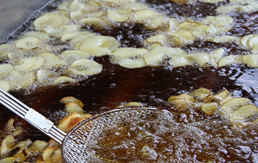Podcast for 1 July 2011
A failing grade for fat substitutes, a master regulator gene for fat, a brainwave that helps control …


A failing grade for fat substitutes, a master regulator gene for fat, a brainwave that helps control …
A tiny fragment of a single gene makes or breaks the all-important folding of brain tissue.
Reindeer can detect ultraviolet light with their retinas, which may help them survive dark Arctic …

The genes behind unfaithful finches, mapping the diversity of bird plumage colors, what feathers can …
A listener asks: How do baby birds get enough water when they’re still in the nest?
Evidence from ancient teeth suggests that most Neanderthals were right-handed, like us.
To study how we perceive our environment, scientists created the illusion of being either Barbie …
